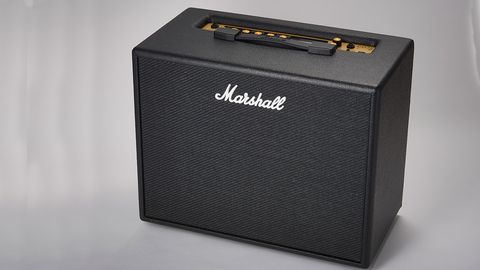The all-new CODE range from Marshall fills a gap in its catalogue that other manufacturers have been plugging for some time.
The affordable, digital front-end, combined witha solid-state power amp and software partner app is a popular choice home users, so how does the CODE range stack up?
The line-up spans everything from a 25-watt 1x10 combo to a beefy 100-watt 2x12 combo and head - here we're looking at the CODE50 combo, which packs a 50-watt power stage in a 1x12 enclosure.
For the CODE, Marshall developed a range of modelled preamps, power amps and speaker cabinets in collaboration with software plug-in supremo Softube, calling the result MST (Marshall- Softube).
There's plenty of choice, too: the CODE50 comes loaded with 14 MST preamps, four MST power amps and eight MST speaker cabinets. These cover every classic Marshall tone from the past 50 years - including the JTM45, 1962 Bluesbreaker, 1959 Super Lead, JCM800, Silver Jubilee and the JCM2000, right up to the current flagship JVM410, not to mention some classic American amp sounds as well.
It all compares favourably with amp modelling combos from the likes of Line 6 and Blackstar. Coupled with this mouth-watering choice of tone, 24 effects cover practically all vintage and modern needs, together with studio-quality reverbs.
"It has every classic Marshall tone from the past 50 years."
A total of 100 presets means you'll never run out of space to store your favourite sounds, while editing is done either from the front panel or Bluetooth, using Marshall's Gateway interface app, which updates settings in real time.
Other clever features include a USB interface, used for updating firmware and recording to your PC or DAW, and there's also a built-in tuner, mp3 player input and headphones socket.
To the right of the familiar-looking matt-finished gold control panel is a large, orange-lit LCD display and a pair of knobs that scroll through presets and put the CODE into edit mode.
We install the Gateway app on to an iPhone running the latest iOS software to try it out. Apple isn't the most Bluetooth-friendly mobile device builder and as expected, it takes us a few attempts to pair the iPhone with the CODE, but on the third try everything hooks up with no issues and from then on, it's all plain sailing.
Modelling amps live or die by their factory presets, as these are often the first and last things a potential buyer tries. The CODE's are generally very good - yes, there are ambient sounds and trick delays that show off the DSP's processing power, but alongside these are some very authentic and highly usable tones that can go straight onto a track with a minimal tweaking.
EL34 Heaven is the obligatory, all-guns-blazing instant gratification patch, while Plexi Classic is an astonishingly good emulation of the legendary Super Lead. We're also mightily impressed with the CODE's JCM800 voice, shown off best in the NWOBHM patch.
When we stripped away the effects, all the main sounds are impressively accurate and flatter every guitar we try out, without robbing the guitar's character: a Strat still sounds like a Strat, and a Les Paul still sounds like a Les Paul.
The tones are at least as good as the competition, and although streaming music into the amp via Gateway or USB sounds okay, you face the limitation that the amp speakers are for guitar, not full-range hi-fi.
As you might expect from a Marshall, the CODE50 is loud and very giggable, with plenty of clean headroom as long as the effects are kept back in the mix. Used with a full band, the CODE50 easily keeps up with a powerful drummer and keyboards, but with a caveat: in a live setting, the PEDL-91009 foot controller is really essential, but will set you back an extra £39.
The digital modelling arena is packed with lots of very clever products all fighting for your cash, and other manufacturers are now going to have to fight harder still.
- Get more for less with the best budget guitar amps

